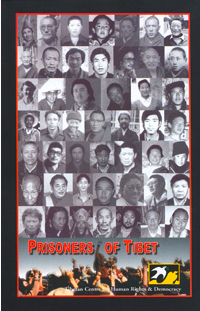Prisoners of Tibet Special Report

Tibetan Centre for Human Rights and Democracy Special Report
TCHRD Releases New Prisoner Report
The Tibetan Centre for Human Rights and Democracy (TCHRD) releases a new report "Prisoners of Tibet". The report launched during a side event today at the ongoing 4th session of the Human Rights Council in Geneva highlights the tragic consequences Tibetans bear for exercising their fundamental human rights of expression, opinion and conscience.
Tibetans are victims of an authoritarian government that feels free to impose arbitrary punishment on anyone who exercises basic human rights, which are guaranteed by international law and nominally protected under the Chinese constitution. Under current law and practice, Tibetans are imprisoned either through summary judicial process or an administrative detention of no longer than four years. It is virtually impossible to know the true number of political prisoners as China does not allow independent organizations to visit prisons, labour camps and detention centers on a regular and systematic basis.
According to TCHRD records, there are currently 116 known Tibetan political prisoners out of which 51 are serving a sentence of ten years or more. Monks and nuns number 80 or 69% of the total number of political prisoners in Tibet. The actual number of Tibetan political prisoners is likely to be higher than the above-cited figure. Former political prisoners form the major source of information while friends and relatives of prisoners who have recently escaped into exile are also a major and valuable source of information. Information on political imprisonment in Tibet is generally treated as "state secret" and chargeable for "espionage" and thrown into jail for long terms if anyone caught with passing information. There is a culture of fear and a palpable sense of self-censorship on the part of Tibetans and a deep seated and widespread zero-tolerance of any activity or viewpoint that is perceived to challenge the Communist Party’s control over the aspects of society it deems crucial on the part of the authorities. Torture is a regular feature in Chinese administered prisons in Tibet. Since 1987, there have been 88 known death of Tibetan political prisoners as a direct result of torture and inhuman treatment in prison.
For many years Drapchi Prison housed majority of Tibetan political prisoners and was known notoriously for the inhumane treatment met to political prisoners. In early 2005, Chushul (Ch: Qushui) Prison became operational, since then most of the political prisoners have been transferred to this new facility. The prison located away from Lhasa City (approx 120 kms) enables the authorities to keep visitors away and maintain a tighter control on the prisoners. Manfred Nowak, the UN Special Rapporteur on Torture, after a visit to the prison on 27 November 2005, described that the prisoners complained the basic conditions were better in Drapchi than in Chushul Prison.
This report contain profiles of most of the current known Tibetan political prisoners.
Click here for a copy of Prisoners of Tibet
- Topical Reports
Topical Reports - TCHRD Publications




